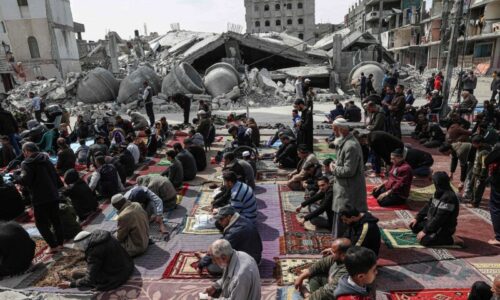By Ahsan Ansari
Recent remarks by former U.S. President Donald Trump regarding Gaza have sparked widespread outrage among Palestinian and Arabs. Trump’s idea which suggested relocating Palestinians from Gaza to Egypt and Jordan, perceived as advocating forced displacement, drawing strong condemnation from advocacy groups, political leaders, and human rights activists.
Palestinian and people from all over the world see Trump’s remarks as dehumanizing and an attack on their people’s fundamental right to their homeland. The Muslim Public Affairs Council (MPAC) condemned the comments, warning that normalizing such rhetoric could have dangerous policy implications. MPAC and other advocacy groups argue that forced displacement is not a solution but a human rights violation that could destabilize the region further.
Even Arab American leaders who previously supported Trump have expressed their dismay. In key battleground states like Michigan, Trump previously benefited from Arab American support, but his recent statements have been viewed as a betrayal. Dr. Bishara Bahbah, a Palestinian American businessman and former Trump supporter, called on Trump to honor his past commitment to a two-state solution rather than promoting mass displacement.
Palestinian activists and organizations across the U.S. have responded with frustration, arguing that Trump’s comments reflect a colonial mindset that treats Palestinian land as disposable. Community leaders emphasize that Gaza is not merely “real estate” to be redeveloped but a homeland with deep historical and cultural significance for millions of Palestinians.
The reaction from the Muslim world has been overwhelmingly negative. Arab nations, including Egypt and Jordan—both of which were mentioned in Trump’s proposed relocation plan—have categorically rejected the idea. Egyptian and Jordanian officials have reiterated their commitment to Palestinian sovereignty and warned against any attempts to alter the region’s demographics through forced displacement.
Mirette Mabrouk, a senior fellow at the Middle East Institute, described Trump’s comments as “extremely serious,” highlighting concerns that Washington might pressure Middle Eastern leaders to accept Palestinian refugees. Analysts suggest that Jordan and Egypt, despite being major recipients of U.S. aid, will likely resist such proposals due to political instability concerns and the long-standing commitment to Palestinian statehood.
The Arab League and the Organization of Islamic Cooperation (OIC) issued strong statements rejecting any calls for forced Palestinian displacement, emphasizing that such actions would constitute a grave violation of international law.
Muslim-majority countries, including Turkey, Pakistan, and Indonesia, have also condemned Trump’s rhetoric, warning that it could escalate tensions in an already volatile region. Saudi Arabia’s stance remains a key factor in the broader geopolitical equation, as analysts speculate that Trump’s proposal might be an indirect attempt to pressure Gulf states into supporting U.S.-Israeli plans for Gaza and the West Bank.
Trump’s proposal has drawn parallels to the 1948 Nakba (catastrophe), when hundreds of thousands of Palestinians were forcibly displaced from their homes during the creation of Israel. Many experts warn that any large-scale displacement of Palestinians from Gaza would effectively be a continuation of this historical trauma. Bezalel Smotrich, Israel’s far-right finance minister, confirmed that he is working with Prime Minister Benjamin Netanyahu on a plan aligned with Trump’s vision for Gaza, raising further fears of ethnic cleansing.
Waleed Hazbun, a professor of Middle Eastern Studies at the University of Alabama, warned that Trump’s idea of making Gaza into a “Middle Eastern Riviera” could be used as a bargaining chip, though its broader implications remain troubling. He criticized the notion of “cleaning out” the region, pointing out that similar rhetoric has historically led to mass displacement and long-term humanitarian crises.
Trump’s remarks have also fueled tensions within the broader Arab American voting bloc. Many Arab American voters previously supported Trump due to dissatisfaction with President Joe Biden’s handling of the Gaza crisis. However, his latest remarks may shift political allegiances, as many feel that his stance disregards Palestinian rights and international law. Rabiul Chowdhury, co-founder of Muslims for Trump, admitted that Trump’s comments were frustrating but maintained that Trump’s overall policy stance was preferable to Biden’s unwavering military support for Israel.
Trump’s recent remarks on Gaza have deeply angered Palestinian Americans, Arab American leaders, and the broader Muslim world. His statements are seen as not only offensive but also dangerous, as they normalize discussions of forced displacement, a violation of international law. Palestinian activists and advocacy groups continue to push back against such rhetoric, emphasizing that any lasting solution must recognize Palestinian rights and self-determination.
As promised in the 2024 U.S. presidential election, Trump’s categorically stated about two state solution of the Israel and Palestine. Many who previously backed him are now reconsidering their choices, as his latest comments appear to contradict his earlier promises of advocating for a peaceful two-state solution. With international pressure mounting and diplomatic tensions rising, the future of Gaza remains one of the most contentious issues in both American and global politics.
(Email: aahsan210@gmail.com)




